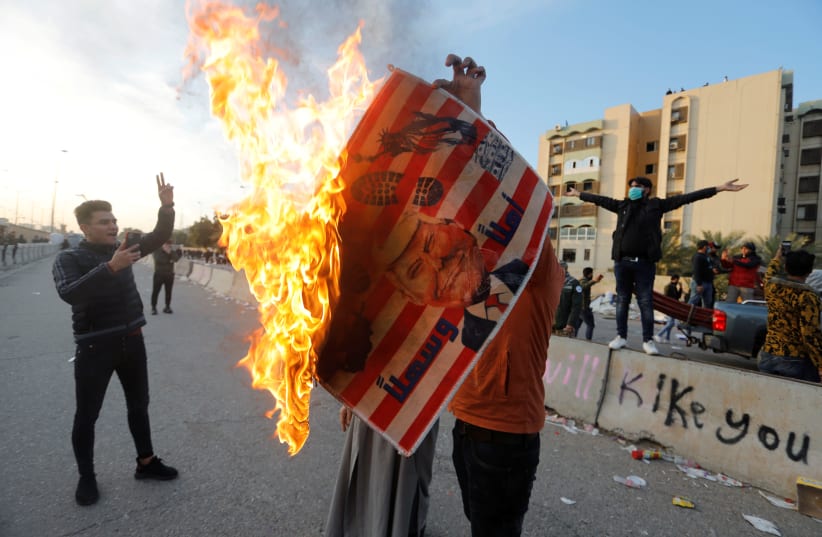Syrian regime forces and Iranian militias fired three shells at the Conoco gas field in the Deir Ezzor area of eastern Syria and two rockets were fired at the Green Zone where the US embassy is located on Sunday evening in the aftermath of the US airstrike that killed IRGC Quds Force commander Qasem Soleimani, according to Arab reports.
No casualties were reported in the Conoco attack, according to local news source Deir Ezzor 24.According to Reuters, six rockets fell in and near the Green Zone in Baghdad. Several civilians in the area were injured, according to Al Arabiya.
Iran-backed Iraqi militia commander Qais al-Khazali said on Sunday if US troops do not leave Iraq, they would be considered an occupying force.
Khazali was speaking after Iraq's parliament backed a recommendation by the prime minister to end the presence of foreign troops in response to the Soleimani attacks.
Iraqi Kataib Hezbollah Brigades warned Iraqi security forces to be at least 1,000 meters (3,280 feet) away from all American bases starting Sunday evening. The brigades cautioned Iraqi forces from serving as human shields for US forces.
The shelling came after Iranian-backed militias and US forces traded blows on Saturday night, as rocket attacks targeted Baghdad's Green Zone and a base housing US forces, followed by a series of attacks on bases housing Iranian and pro-Iranian forces in Iraq and Syria.
The attacks came as Iranian militias and officials ratcheted up threats against American forces in the region.
Militias along the Iraq-Syria border have been high alert since the strike on Soleimani. An air strike reportedly struck an Iranian-militia base near the border within Syrian territory on Saturday night, according to Arab media.
Multiple people were injured and killed in the airstrike targeting a base belonging to the Shi'ite Popular Mobilization Forces (PMF) along the Iraqi-Syrian border, according to Al Arabiya.
Three military vehicles were destroyed in an airstrike on Iranian-backed militias in Deir Ezzor in Syria along the border with Iraq, according to Deir Ezzor 24. The news site earlier reported a possible strike in Albukamal, which is home to a major Iranian base.
Earlier this week, a new Iranian-backed militia called the "al-Sayyida Zeinab Regiment," arrived in Albukamal along the Iraq-Syria border.
Earlier, rocket attacks were reported on the presidential palace and the al-Kindi camp in Mosul, Iraq, but an Iraqi commander later denied that there had been any attack on the two sites, according to the Iraqi Al Sumaria news.
A rocket fell in the Green Zone in Baghdad near where the US embassy is located. Three people were injured in the attack, according to Al-Sumaria.
Multiple rockets fell inside the Iraqi Balad air base housing US soldiers on Saturday evening. Three Iraqi soldiers were injured in the attack on the Balad air base, according to Al Arabiya.
The United States-led military coalition fighting Islamic State said early on Sunday that there were two attacks near Iraqi bases housing its troops on Saturday night but that none of its troops were harmed. The attacks potentially harmed Iraqi civilians, it said.
Red flags were raised over mosques in Syria and Iran to signify that revenge that would be taken for the killing of Soleimani, according to Arab media.
IRGC commander Hossein Salami warned that the response to Soleimani’s killing would be carried out in a “vast geography throughout time and with determining impacts” and would “end the US presence in the region,” according to the Iranian Fars news agency.
An Omani envoy who visited Iran was told that Tehran is not interested in any mediation and left without meeting with officials on Saturday, according to Al Mayadeen.
Solemani and Iraqi militia commander Abu Mahdi al-Muhandis, along with at least 10 other people, were killed in a US air strike in Baghdad on Thursday.
Reuters contributed to this report.
